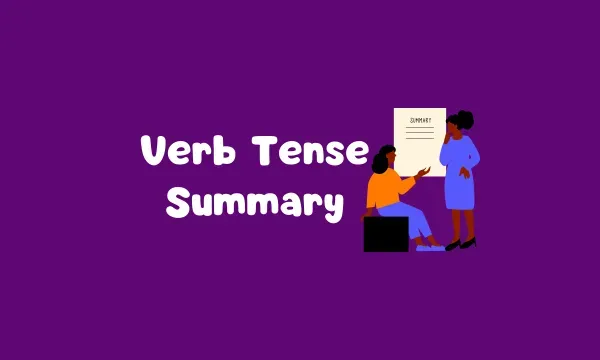Verb Tense Summary
Introduction:
If you want to learn how to use verb tenses correctly in English, you have come to the right place. In this article, we will give you a summary of the main verb tenses and their uses, with examples and quizzes to test your knowledge. Whether you need to write an essay, a report, or a blog post, knowing how to use verb tenses will help you communicate your ideas clearly and accurately. You will also improve your grammar and avoid common mistakes. Read on to find out more about verb tenses and how to master them.
1. Simple tenses:
a) Simple present - used to describe actions that are happening right now or are always true
Examples:
- I eat breakfast every day.
- The Earth revolves around the Sun.
b) Simple past - used to describe action completed in the past
Examples:
- I finished my homework yesterday.
- She saw the movie last night.
c) Simple future - used to describe actions that will happen in the future
Examples:
- I will call you tomorrow.
- They are going to travel next summer.
2. Continuous tenses:
a) Present continuous - used to describe actions that are currently happening and in progress
Examples:
- She is eating dinner right now.
- They are watching a movie.
b) Past continuous - used to describe actions that were in progress at a specific time in the past
Examples:
- We were playing football at this time yesterday.
- They were studying for the exam all night.
c) Future continuous - used to describe actions that will be in progress at a specific time in the future
Examples:
- I will be flying to New York next week.
- They will be studying for their exam this time tomorrow.
3. Perfect tenses:
a) Present perfect - used to describe actions that happened in the past and are still relevant in the present
Examples:
- She has finished her work.
- He has visited London.
b) Past perfect - used to describe actions that were completed before a specific past event
Examples:
- We had eaten dinner by the time he arrived.
- They had finished the project before the deadline.
c) Future perfect - used to describe actions that will be completed at a specific time in the future
Examples:
- I will have completed the task by the end of the day.
- They will have finished the race by this time tomorrow.
<->
Past, Present, or Future Tense Quiz
Conclusion
Mastering verb tenses is crucial for clear and effective communication in English. By understanding and using the simple, continuous, and perfect tenses correctly, you can accurately convey the timing and progression of actions. Whether you're describing daily routines with the simple present, ongoing activities with the present continuous, or completed actions with the future perfect, these tenses provide the structure needed to express your thoughts clearly.
Remember, practice is key to becoming proficient in using these tenses. Incorporate examples in your writing and speaking to reinforce your learning. For students and educators, grasping these concepts will significantly enhance both written and verbal communication skills. Keep practicing, and you'll soon find that navigating the complexities of English verb tenses becomes second nature.

